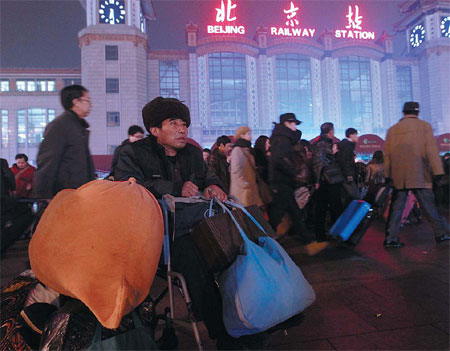The journey home begins for millions
 |
|
The Beijing Railway Station is one of the busiest places in China during the world's biggest travel rush. Cui Meng / China Daily |
The world's largest migration of humanity starts, report He Na and Jiang Xueqing.
Every year, at this time, millions of Chinese embark on the world's biggest travel rush - the trek home.
With joy, or possibly frustration after toiling for the past year, a huge proportion of the population will set out on a journey of reunion for the country's most important holiday - Spring Festival.
Possibly as many as a billion people will shuttle between the cities where they live and work and their hometowns for the holiday.
|
 |
 |
To ensure the smooth running of the world's largest annual migration, extra travel services are being organized from Jan 26 until March 6. A record 3.41 billion trips are expected to be made.
In addition to the railway system, which will bear the brunt of the pressure, airlines, road and shipping networks have all geared up to meet the surge in passenger numbers.
The rail network is expected to handle 225 million trips, while long-distance buses will transport up to 3.1 billion passengers. The combined figure accounts for 99 percent of China's rail and bus capacity, according to Xinhua News Agency.
Some 35.5 million journeys will be made by air during the festival's peak, a rise of 4.9 percent from the same period last year.
Obviously, such a huge number of travelers will stretch the country's transport network to its limits and pose challenges for each part of the system.
While some will enjoy the luxury of air travel, for many millions more the journey means being stuck in overcrowded train carriages for long, boring journeys that will take many hours.
China Daily asked five people, representative of different groups in society, to share their stories of the journey home.
The student

Each Spring Festival since 2011, Lin Tongfei, a 23-year-old graduate student at the School of Journalism and Communication at Renmin University of China, has undertaken the long haul back to his hometown in Pingtan county, Fuzhou city.
Only three trains a day make the journey from Beijing to Fuzhou, the capital of East China's Fujian province.
Train No Z59 leaves Beijing West Railway Station at 3:08 pm and arrives at 10:50 am the following day. Although the journey lasts a grueling 19 hours and 42 minutes non-stop, the train is usually on schedule. A ticket for a hard-sleeper bed costs 436 to 466 yuan ($70-75) for an adult and around 300 yuan for a student.
Train No K45 is much slower, taking more than 34 hours to travel between the cities. Train No D365 only takes 15 hours and 10 minutes. It leaves Beijing at 7:35 am and arrives in Fuzhou at 10:45 pm, but the tickets are more expensive. A second-class soft seat costs 673 yuan.
"D365 is not a good choice for me, given the ticket price and schedule," said Lin. "It arrives at Fuzhou late in the evening, but my home is still a two-and-a-half hour drive away. If I take that train, I have to stay overnight at a relative's home in Fuzhou and then I have to take a bus before 6 am in the winter chill."
Lin was desperate to book a ticket for a hard-sleeper bed on Z59 because the schedule is passenger-friendly and the ticket is affordable. He can sleep on the train and arrive home in the afternoon of the following day.
The pre-sales window opened 20 days before his scheduled departure date of Jan 25, so Lin rose before 8 am and logged on to www.12306.cn, the only official online ticket-purchasing platform operated by China's Ministry of Railways. The website told him tickets were still available, but every time he submitted an order, he received a failure notice, which either informed him that tickets were sold out or that too many people were waiting in front of him.
For three consecutive days, he and a friend attempted to buy a ticket on the website, spending at least 90 minutes online every morning. Their efforts came to nothing. Eventually they gave up. In the end, he got a hard-seat ticket for Z59 through the help of his university.
"The train ticket-purchasing platform is not transparent," he said. "People have no idea whether the tickets are sold out or not. Sometimes, I find dozens of tickets are still available on the website, but when I file an order, the tickets are suddenly down to zero. Often, you will find people buying sleeper-bed tickets after they have boarded the train, even though the website has said the tickets are sold out."
Moreover, not everyone has access to the Internet, which makes it difficult for migrant workers and elderly people, who are not keen on new technologies, to buy tickets online, he added.




















